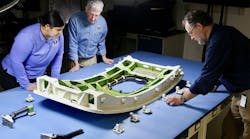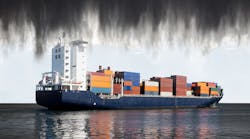In retrospect, it seems obvious that the frustrations and missed opportunities stemming from the supply-chain failures endured by manufacturers during 2020-22 should result in chronic anxiety about the overall security of businesses. What was understood as simple economics – “How much will it cost to maintain regular delivery of X?”; or “Where can we find a better source for Y?” – has turned into continual doubts about manufacturing’s stability, or reliability, or sustainability, to borrow the current terminology.
Among the metalcasters surveyed in late 2023, FM&T found that 23% of businesses had dealt with supply-chain disruptions, and 26% of respondents worried about the on-time delivery of their own products to customers. Related issues like material shortages and energy shortages also registered . And those respondents project similar unease over such issues recurring in 2024.
“Choice” and “availability” were among the great promises of a global supply chain, and later network technologies added speed and wider selections to the whole proposition. These were promises not just to the businesses but to the individuals that are their decision-makers. The assurance was collective and personal, and so now is the lack of confidence.
According to a Sapio Research study cited by ABB Motion in a new whitepaper, 92% of industrial businesses in 12 countries are suffering from the effects of resource scarcity. Their greatest worry is the unavailability of raw materials (cited by 39%), and the entire dilemma is joined to the ongoing concern about the scarcity of skilled labor.
More than this, resource scarcity has increased costs for 39% of manufacturing businesses, as have supply-chain disruptions (also 39%) and slowdowns in production capacity for supplying their downstream customers (29%.)
Most of the individuals bearing up under all this stress will point to the Covid-19 pandemic as the start of it, but that would fail to account for all the other complications that have left decision-makers to ponder their problems with diminishing confidence. Federal and state regulations define how manufacturers can perform most of the tasks of their workplaces, and their strategies for future projects. Accumulating atop those regulations are corporate governance guidelines imposed on businesses by investors or lenders to manifest “inclusiveness” and similar values, tying the decision-makers in yet another way.
Looming ahead are more regulations that appear in the form of “targets,” such as the net-zero emissions goals that determine so many choices for European foundries and other manufacturers. If that’s not a factor for domestic businesses now, it nevertheless shows up as a concern for respondents to the Sapio Research study.
Ironically, or maybe not, the proposals for addressing all this uncertainty come down to more and more restrictive standards for operating businesses – such as the emerging argument for “circular economy” principles, which recenter the focus of decisions on product and system design, not production; elevate waste reduction and pollution elimination as operating objectives, and attach primary value to recyclable contents.
Like the withering promises of global markets, it’s an economic and environmental idealism imposed from without, and with even less regard for rewarding the human participants it would manage, and no response for the anxiety it induces.
Goals and targets are fine things, and they can give purpose to the strategies that businesses adopt to coordinate their activities. But they will not fill the shortage of confidence unsettling the people striving to keep solid businesses working, despite all the options being taken from them.









